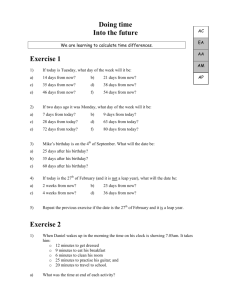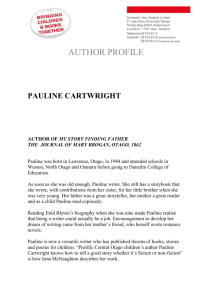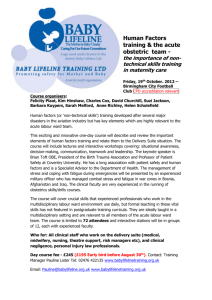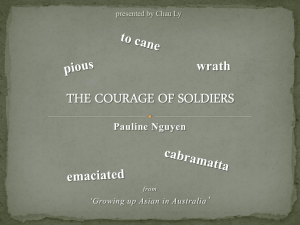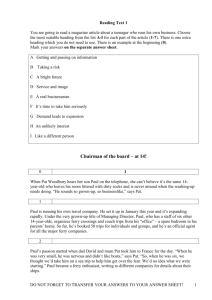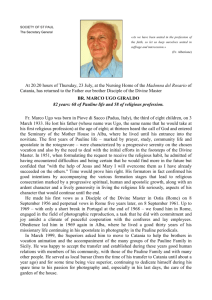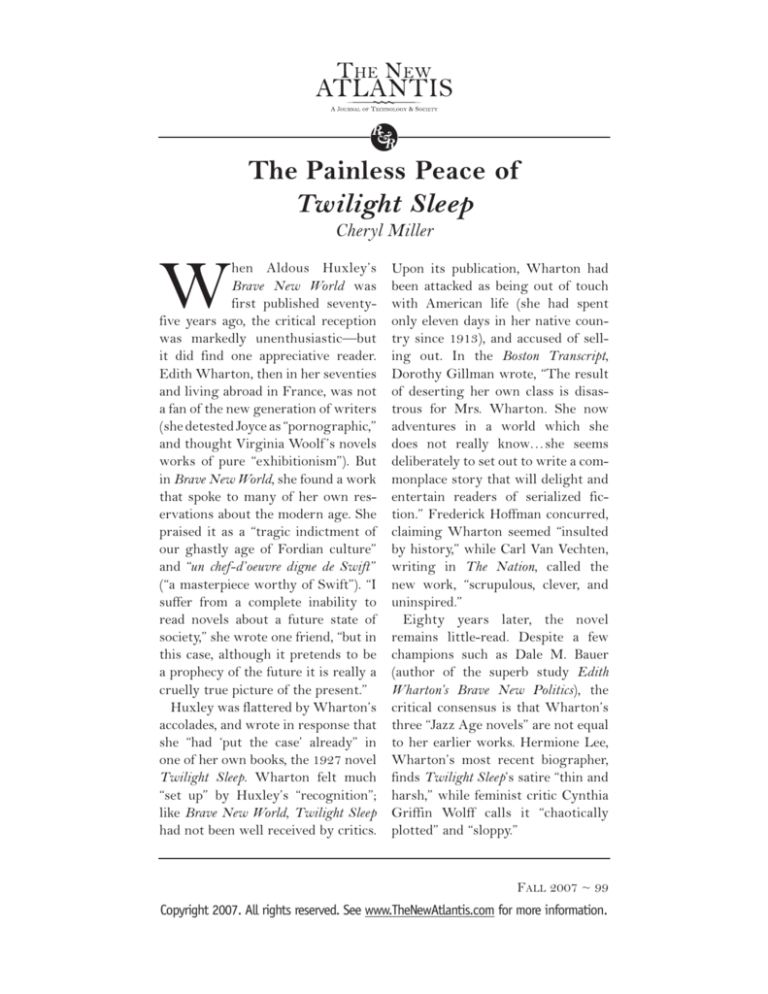
2
2
The Painless Peace of
Twilight Sleep
Cheryl Miller
W
hen Aldous Huxley’s
Brave New World was
first published seventyfive years ago, the critical reception
was markedly unenthusiastic—but
it did find one appreciative reader.
Edith Wharton, then in her seventies
and living abroad in France, was not
a fan of the new generation of writers
(she detested Joyce as “pornographic,”
and thought Virginia Woolf ’s novels
works of pure “exhibitionism”). But
in Brave New World, she found a work
that spoke to many of her own reservations about the modern age. She
praised it as a “tragic indictment of
our ghastly age of Fordian culture”
and “un chef-d’oeuvre digne de Swift ”
(“a masterpiece worthy of Swift”). “I
suffer from a complete inability to
read novels about a future state of
society,” she wrote one friend, “but in
this case, although it pretends to be
a prophecy of the future it is really a
cruelly true picture of the present.”
Huxley was flattered by Wharton’s
accolades, and wrote in response that
she “had ‘put the case’ already” in
one of her own books, the 1927 novel
Twilight Sleep. Wharton felt much
“set up” by Huxley’s “recognition”;
like Brave New World, Twilight Sleep
had not been well received by critics.
Upon its publication, Wharton had
been attacked as being out of touch
with American life (she had spent
only eleven days in her native country since 1913), and accused of selling out. In the Boston Transcript,
Dorothy Gillman wrote, “The result
of deserting her own class is disastrous for Mrs. Wharton. She now
adventures in a world which she
does not really know. . . she seems
deliberately to set out to write a commonplace story that will delight and
entertain readers of serialized fiction.” Frederick Hoffman concurred,
claiming Wharton seemed “insulted
by history,” while Carl Van Vechten,
writing in The Nation, called the
new work, “scrupulous, clever, and
uninspired.”
Eighty years later, the novel
remains little-read. Despite a few
champions such as Dale M. Bauer
(author of the superb study Edith
Wharton’s Brave New Politics), the
critical consensus is that Wharton’s
three “Jazz Age novels” are not equal
to her earlier works. Hermione Lee,
Wharton’s most recent biographer,
finds Twilight Sleep’s satire “thin and
harsh,” while feminist critic Cynthia
Griffin Wolff calls it “chaotically
plotted” and “sloppy.”
FALL 2007 ~ 99
Copyright 2007. All rights reserved. See www.TheNewAtlantis.com for more information.
CHERYL MILLER
The novel’s plot is indeed disjointed, its disorder meant, as Wolff
recognizes, to reflect the restlessness and constant turmoil of life
in America after the Great War.
It focuses on Pauline Manford, the
wealthy, emancipated matriarch of a
socially prominent New York household. Pauline, a sort of Jazz Age
Mrs. Jellyby (as Lee calls her), is a
relentless do-gooder, taking up donations for Bolivian earthquake victims
and serving on endless committees
for her many causes. Meanwhile, her
second husband, Dexter, begins an
affair with Lita, the beautiful wife of
his stepson Jim. Only Nona (Pauline
and Dexter’s daughter) and Arthur
Wyant (Pauline’s much-abused first
husband), suspect the truth. The
melodramatic climax comes when
Arthur discovers Dexter in Lita’s
bedroom, and attempts to kill Dexter.
Instead, he shoots Nona, who had
rushed in hoping to break off the
affair. Pauline, ever worried about
appearances, covers up the near-fatal
incident, and the entire family soon
decamps overseas to avoid publicity.
What appears on first glance to be
a mere domestic melodrama is really
a searching examination of the new
society profoundly shaped by modern
science and commerce. Wharton had
long been an avid reader of what she
called the “the wonder-world of nineteenth century science,” and she considered Darwin and Herbert Spencer
to be among the “greatest” of her
“formative influences.” Her library
included heavily-marked copies of
T. H. Huxley (Aldous’s grandfather), Ernst Von Haeckel, George
Romanes, and Edvard Westermarck.
Scientific themes appear often in her
work. She drew on her knowledge
of anthropology and sociology (particularly Thorstein Veblen’s theory
of conspicuous consumption) for her
great novels of the teens: The House of
Mirth, The Custom of the Country, and
The Age of Innocence. One of her most
famous short stories is even titled
after Darwin’s The Descent of Man.
B
y the 1920s though, Wharton
began to question the moral
aims of modern science, particularly
its ambition to relieve men of pain
and suffering. She was distrustful
of a “world that believed in panaceas.” As she warned one would-be
revolutionary, “The evils you rightly
satirize will be replaced by others
more harmful to any sort of civilized
living.” This warning would serve as
the theme of her Jazz Age novels: The
Glimpses of the Moon (1922), Twilight
Sleep, and The Children (1928). In
each, she would depict a set of freethinking moderns who believe they
have “settled in advance all social,
religious and moral problems,” yet
still come “to grief over the same old
human difficulties.”
Wharton pursued this theme most
forcefully in Twilight Sleep. The
novel’s title refers to the mixture
of scopolamine and morphine physicians administered to women to
100 ~ THE NEW ATLANTIS
Copyright 2007. All rights reserved. See www.TheNewAtlantis.com for more information.
THE PAINLESS PEACE OF TWILIGHT SLEEP
allow them to “forget” the pains of
childbirth. The term appears at the
end of the first chapter as Pauline
recalls how she arranged for Lita to
be admitted into the choicest hospital
for the birth of her and Jim’s son.
The procedure’s purpose was eugenic, a subtext at which Wharton hints
with Lita’s request that “nothing
should ‘hurt’ her” during her labor.
By relieving this pain, the advocates
of “twilight sleep” hoped to enable
“delicate” women like Lita and those
of her set (i.e., the upper crust) to
have more children, thus providing, as the medical historian Judith
Walzer Leavitt explains, “a ‘better
race for future generations.’”
It’s a goal that Pauline, an enthusiastic disciple of modern science,
shares. “Of course there ought to
be no Pain,” she thinks. For Pauline,
“avoidance of pain” is the “ultimate
end,” and the eugenic production
of offspring, using only “superbly
sound progenitors,” is but one tactic
in modern science’s arsenal. Babies
are “something to be turned out
in series like Fords,” the end-product of “months and years of patient
Taylorized effort against the natural
human fate: anxiety, sorrow, old age.”
Thus, “twilight sleep,” for Wharton,
is more than just a medical procedure.
It symbolizes man’s rebellion against
“the natural human fate,” the foolish hope that he can forget human
nature and all its attendant evils:
pain, anger, jealousy, lust, and grief.
The means by which this rebellion
is to be effected is modern science,
motivated by man’s “blind dread of
physical pain.”
But the morbidity at the root of the
scientific worldview is bedimmed by
the obscuring hope of progress. Fear
cannot be dealt with directly (say, by
courage), so it is evaded, kept at bay
by an ever-increasing array of remedies and by the determined effort
to think only “happy thoughts.” Like
Mrs. Welland in The Age of Innocence,
Pauline insists on keeping her mind
“bright and happy.” She regards life
as “a Sunday school picnic, with
lemonade and sponge cake as its
supreme rewards.” Discussion of
anything “unpleasant” is assiduously
avoided—and if it cannot be avoided,
then forgotten just as the drugged
women in “twilight sleep” forget the
pain of labor.
The forgetfulness of twilight sleep
(and of the scientific enterprise)
applies not only to pain, but also
to the past. America is the land of
progress, its citizens so focused on
the bright future they imagine they
have no time for the past. To them,
Europe is only the site of “obsolete
superstitions unworthy of enlightened Americans,” lacking in such
modern conveniences as plumbing,
dentistry, and easy divorce. Thus, the
only culture Pauline and the others
participate in is wholly situated in
the present: cinema, gossip rags,
and jazz clubs. The family’s home is
full of books but no one ever reads
them. Dexter does attempt a course
FALL 2007~ 101
Copyright 2007. All rights reserved. See www.TheNewAtlantis.com for more information.
CHERYL MILLER
of literary reading, starting with
Tallentyre’s Voltaire, which he finds a
“revelation” since he had never heard
of Voltaire, but his education ends
with his second book, the first volume of Macaulay, which he thinks too
long. Pauline, a professed Christian,
is flummoxed when Nona reminds
her of Christ’s suffering on the cross:
“The idea of stirring up troublesome
mysteries of Christian dogma at the
breakfast-table!” she fumes.
Wharton’s critics may have accused
her of being detached from modern
American life, but she remained a
keen, if disapproving, observer of
modes and fashions. She stashed
away stacks of news clippings and
advertisements heralding the newest
detergent or latest scientific “breakthrough.” Twilight Sleep is stuffed
with these researches, with Pauline
sampling every 1920s fad: psychoanalysis, New Age spiritualism, selfhelp books, consumer science, drugs,
plastic surgery, and, of course, eugenics. “America really seemed to have
an immediate answer for everything,”
Pauline thinks, “from the treatment
of the mentally deficient to the elucidation of the profoundest religious
mysteries.”
Those alleged answers become a
subject of Wharton’s vicious satire.
Just a page from Pauline’s crowded
calendar (“7.30 Mental uplift. 7.45
breakfast. 8. Psycho-analysis. 8.15
See cook.”) affords Wharton a crack
at the modern desire for immediate
gratification and control, the idea
that all problems can be solved in a
matter of minutes. With Pauline’s
various self-improvement exercises,
Wharton lampoons the burgeoning
self-help industry, as exemplified by
Émile Coué’s 1922 bestseller, SelfMastery Through Conscious AutoSuggestion, with its recommendation
that the reader recite aloud every
morning the mantra: “Every day, in
every way, I am getting better and
better.” Pauline’s many gurus are
also all based on real-life persons;
for instance, the Mahatma, with his
hip-slimming exercises, is drawn
from the popular yogi, Paramahansa
Yogananda, who gave lectures at
Carnegie Hall with such pseudoscientific titles as “Everlasting Youth:
Psycho-Physiological Rejuvenation
of Cells by Recharging the Body
Battery.”
Wharton captures too the hygienic craze that swept America in the
1920s, with hundreds of new cleaning products suddenly lining the
store shelves. Pauline is obsessed
with proper hygiene, even installing a new ventilating system in her
cow-stables. Her bathroom is like
“a biological laboratory, with its
white tiles, polished pipes, weighing
machines, mysterious appliances for
douches, gymnastics, and ‘physical
culture.’” She even smells, her husband thinks, of “a superior disinfectant.” Control is the driving force
behind Pauline’s mania for hygiene; it
is her attempt to fit one more aspect
of life into her “Taylorized” routine
102 ~ THE NEW ATLANTIS
Copyright 2007. All rights reserved. See www.TheNewAtlantis.com for more information.
THE PAINLESS PEACE OF TWILIGHT SLEEP
(after Frederick Winslow Taylor’s
Principles of Scientific Management)
and thereby render it innocuous.
Even sin is to be scientifically managed. “Being prepared to suffer is
really the way to create suffering,”
Pauline counsels Nona. “And creating suffering is creating sin, because
sin and suffering are really one.”
Pauline’s lesson to Nona illustrates
what Christopher Lasch describes as
the translation of moral categories,
such as sin or evil, to medical categories, like pain or disease. To Pauline,
sin is a health problem to be solved
by “the incalculable resources of
American hygiene.” She “want[s] to
de-microbe life,” to “whitewash” pain
and suffering as she would “disinfect”
a dirty cellar. Every problem in life is
amenable to the latest “moral tonic.”
Hearing of Lita’s plans to divorce,
she dismisses them as “frustrations,”
the “new psychological thing,” and
arranges to have Lita visit her spiritual advisor for an “operation.”
Indeed, all of Pauline’s visits to her
various spiritual gurus have the air of
a doctor’s visit, with their emphasis
on exercise, massage, and “hip-slimming.” Alvah Loft, who advertises
himself as “the Busy Man’s Christ,”
practices “operations”—“spiritual
vacuum-cleanings” which promise to
remove the “frustrations” from his
clients “as if they’d been adnoids.”
Pauline is constantly celebrating the
spirituality and soulfulness of her
newest guru, but the state of Pauline’s
soul is curiously absent from all her
consultations. Instead, she is variously diagnosed as suffering from fatigue
or “brain-exhaustion.” Wharton captures here what Huxley calls “the
contemporary tendency for superstition to be magical rather than
religious—to aim at specific acts of
power, such as hip-slimming, rather
than at a theory of the cosmos.” It’s a
tendency, as Huxley put it in a letter
to Wharton, that Pauline “beautifully and ruthlessly exemplifies”; the
consummate consumer, she acquires
more and more but cannot identify
the end toward which she strives.
“They all had these colossal plans for
acquiring power,” Wharton writes,
“and then, when it was acquired,
what came of it but bigger houses,
more food, more motors. . . and more
self-righteous philanthropy?”
P
auline rationalizes her neverending expenditures as the price
of “expressing herself ”—the only
end, besides the avoidance of pain, she
can imagine. She is “all for personal
freedom, self expression,” and never
wants to “feel under any obligation.”
Likewise, Lita tells Nona she doesn’t
“feel like duties,” and claims she cannot be herself in her marriage: “I’m
sort of an all-around fake.”
Pauline is a fake, too; she ultimately has no real self to express.
In her quest for control, Pauline has
annihilated her self, numbing with
drugs or facile “happy talk” any real
feeling she has. Like Lita, she is completely externally directed, lacking
FALL 2007~ 103
Copyright 2007. All rights reserved. See www.TheNewAtlantis.com for more information.
CHERYL MILLER
any inner life of her own. Terrified
at the thought of spending an hour
alone, she must be constantly around
people, and yet she is unable to forge
a connection with anyone, including
her own husband. Intimacy to her is
“the tireless discussion of facts.” To
stave off any hint of “frustration,”
she throws herself into an endless
flurry of appointments and dinner
parties. “She enjoys it as much as
other women do love-making,” her
husband thinks.
But Pauline cannot completely
shake off the old notions of morality and sin, although she is unable
to articulate them when challenged.
Her “moral muscles” have “atrophied” with disuse. She is horrified
by Lita’s stage ambitions and the lack
of shame Lita evinces over a photo of
herself dancing half-nude in one of
the tabloids. But her protest over
the photo’s indecency dies on her
lips at Lita’s assertion that she was
only “expressing” herself. (“She says
she wants to express her personality? Well, every one has the right to
do that—I should think it wrong of
me to interfere.”) Later, when Lita
blithely assumes that Jim is really
her and Dexter’s “love child,” Pauline
becomes outraged at the perceived
insult. But she finds to her horror
that Lita does not mean it as an
“impertinence”; she is undisturbed
by adultery. For Lita, the only “real
wickedness” is to be untrue to one’s
self, in this case, “to go on living with
a man you don’t love.”
Pauline instinctively recoils from
this vision of a sinless world—but
she is powerless to respond, for it
is a vision to which she too subscribes. She had also abandoned a
husband rather than betray herself,
and she had viewed Arthur’s pain
and wounded pride at the divorce
as unreasonable and helplessly oldfashioned. But now that Pauline’s
son, Jim, is the victim, she, like Nona,
comes to question the “new idea of
marriage.” Leaving Lita’s house, she
wonders,
Perhaps, after all, her own principles were really obsolete to
her children. Only, what was to
take their place? Human nature
had not changed as fast as social
usage, and if Jim’s wife left him
nothing could prevent his suffering in the same old way.
Pauline is not heartless, but in
her unwillingness to countenance
pain, she inadvertently hurts those
she claims to love. She thinks she
has handled her first divorce blamelessly, but she doesn’t see that Arthur
has been devastated by her loss and
is slipping into alcoholism. In her
mania to save the world, she neglects
her own family, leaving her daughter
alone to cope with their various
troubles to disastrous results. Nona,
the “bewildered little Iphigenia” of
the novel, is nearly killed—a “vicarious sacrifice” to Pauline’s folly.
Only Nona seeks to understand her
responsibilities, to try to find “the
104 ~ THE NEW ATLANTIS
Copyright 2007. All rights reserved. See www.TheNewAtlantis.com for more information.
THE PAINLESS PEACE OF TWILIGHT SLEEP
best new way of being decent.” “What
troubles me,” she tells Pauline, “is the
plain human tangle, as it remains
after we’ve done our best to straighten it out.” Pauline may pride herself
on being psychic, but it is Nona who
sees the far-reaching and unexpected
effects people can have on one another. She is the first to notice Lita’s
disquiet and her father’s infatuation
with Lita. And while Pauline turns
a blind eye to anything “unpleasant,” Nona seeks out those in pain
and tries to comfort them. She alone
visits the family maid, Maisie, at the
hospital while her mother is having
an operation. Seeing Jim’s misery
after Lita deserts him, she suffers
with him: “Where, for instance, did
one’s own self end and one’s neighbor begin?” Suffering, she realizes,
can have moral worth. When Pauline
chastises her for worrying too much
about Jim, insisting that “we ought
to refuse ourselves to pain,” Nona
counters, “Did Christ?” Someone, she
thinks, must remember that “such
things as wickedness, suffering and
death had not yet been banished from
the earth.”
Nona’s pain in her brother’s loss—
and with it her recognition of the
duties people owe one another—
leads her to renounce the man she
loves rather than break up his marriage. Like Ellen Olenska, another
of Wharton’s tragic heroines, Nona
realizes she cannot “have [her] happiness made out of a wrong—an
unfairness—to somebody else.”
Before, she had shared Pauline’s view
that divorce is just another form of
housekeeping, a way to clean out “all
kinds of domestic evils” and start
anew. But now she begins to doubt.
The “simple reasonable request” for
divorce sounds very differently on
“the lips of the other partner, the
partner who still had a stake in the
affair. . . . It was one thing to theorize
on the detachability of human beings,
another to watch them torn apart by
the bleeding roots.”
That folly leads to more than just
family tragedy, though. The sickness
of the Manford household is shared
by the entire society. Just as the twilight sleep drugs have inured Lita to
the pains of labor, so have the constant “druggings” and “thrills” of the
Jazz Age inured her and her coevals
to any true human emotion or connection. Childbirth connects us to
one another; it is—literally, primitively—the basic link between the
individual and society. The modern
desire to avoid the pain of childbirth
illustrates not just the desire to avoid
pain, but also the extent of our alienation from one another.
The pain of childbirth, recall, is
one of the curses of original sin. The
quest to end that pain, to end all pain,
is finally a quest to make man anew.
But as Nona finds, the experience of
pain is fundamental to empathy; only
through suffering can we understand
what men and women owe one another. Twilight sleep blissfully closes the
eyes—closes them to the pain of
FALL 2007~ 105
Copyright 2007. All rights reserved. See www.TheNewAtlantis.com for more information.
CHERYL MILLER
others, to this broken world of grief
and woe. Perfected man, man without pain, is insensate and completely
alone. The quest for perfection is a
quest for a self-destructive blindness. It is, in the end, an untenable
quest. This world needs our eyes
wide open.
Cheryl Miller, a writer living in
Washington, D.C., is a 2007 Phillips
Foundation Journalism Fellow.
106 ~ THE NEW ATLANTIS
Copyright 2007. All rights reserved. See www.TheNewAtlantis.com for more information.

